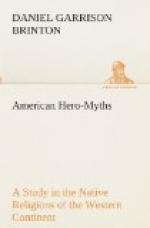THE EXTENSION AND INFLUENCE OF THE TYPICAL HERO-MYTH.
THE TYPICAL MYTH FOUND IN MANY PARTS OF THE CONTINENT—DIFFICULTIES IN TRACING IT—RELIGIOUS EVOLUTION IN AMERICA SIMILAR TO THAT IN THE OLD WORLD—FAILURE OF CHRISTIANITY IN THE RED RACE.
THE CULTURE MYTH OF THE TARASCOS OF MECHOACAN—THAT
OF THE RICHES OF
GUATEMALA—THE VOTAN MYTH OF THE TZENDALS
OF CHIAPAS—A FRAGMENT OF A MIXE
MYTH—THE HERO-GOD OF THE MUYSCAS OF NEW
GRANADA—OF THE TUPI-GUARANAY
STEM OF PARAGUAY AND BRAZIL—MYTHS OF THE
DENE OF BRITISH AMERICA.
SUN WORSHIP IN AMERICA—GERMS OF PROGRESS
IN AMERICAN RELIGIONS—RELATION
OF RELIGION AND MORALITY—THE LIGHT-GOD
A MORAL AND BENEFICENT
CREATION—HIS WORSHIP WAS ELEVATING—MORAL
CONDITION OF NATIVE SOCIETIES
BEFORE THE CONQUEST—PROGRESS IN THE DEFINITION
OF THE IDEA OF GOD IN
PERU, MEXICO, AND YUCATAN—ERRONEOUS STATEMENTS
ABOUT THE MORALS OF THE
NATIVES—EVOLUTION OF THEIR ETHICAL PRINCIPLES.
In the foregoing chapters I have passed in review the hero-myths of five nations widely asunder in location, in culture and in language. I have shown the strange similarity in their accounts of their mysterious early benefactor and teacher, and their still more strange, because true, presentiments of the arrival of pale-faced conquerors from the East.
I have selected these nations because their myths have been most fully recorded, not that they alone possessed this striking legend. It is, I repeat, the fundamental myth in the religious lore of American nations. Not, indeed, that it can be discovered in all tribes, especially in the amplitude of incident which it possesses among some. But there are comparatively few of the native mythologies that do not betray some of its elements, some fragments of it, and, often enough to justify us in the supposition that had we the complete body of their sacred stories, we should find this one in quite as defined a form as I have given it.
The student of American mythology, unfortunately, labors under peculiar disadvantages. When he seeks for his material, he finds an extraordinary dearth of it. The missionaries usually refused to preserve the native myths, because they believed them harmful, or at least foolish; while men of science, who have had such opportunities, rejected all those that seemed the least like a Biblical story, as they suspected them to be modern and valueless compositions, and thus lost the very life of the genuine ancient faiths.
A further disadvantage is the slight attention which has been paid to the aboriginal American tongues, and the sad deficiency of material for their study. It is now recognized on all hands that the key of a mythology is to be found in the language of its believers. As a German writer remarks, “the formation of the language and the evolution of the myth go hand in hand."[1] We must know the language of a tribe, at least we must understand the grammatical construction and have facilities to trace out the meaning and derivation of names, before we can obtain any accurate notion of the foundation in nature of its religious beliefs. No convenient generality will help us.




